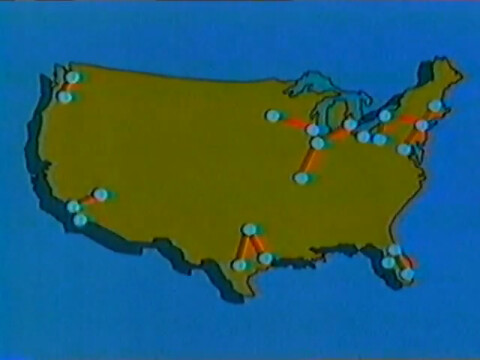To me, the moved smelled of fear. It seemed that Democrats around the country began knuckling under the apparent might of the Republicans. While the election took place on November 2nd, nobody's going to take office until the beginning of January, so I've been a bit baffled why anyone would want to change their behavior at this point.
I partly refrained from writing anything because I want to take the long view. High-speed rail has been examined between Chicago and the Twin Cities for decades. The earliest studies I've been able to find date to 1990/1991, though there's evidence that such a link had been studied even earlier. This map comes from Nova's 1982 episode "Tracking the Supertrains", and clearly shows a Twin Cities link:

We've been waiting 30 years or more for a return to higher speeds in the corridor. I was born in 1978, and I certainly don't our progress to slow further. I am willing to wait a little bit if the Illinois, Wisconsin, and Minnesota Departments of Transportation are interested in building a train that would go significantly faster than 110 mph, or if there are modest technical issues that need brief delays on the order of months. I am not willing to wait for the "next big thing", however—We don't need a maglev, for instance. Trains using existing steel wheel on rail technology works just fine.
Getting back to Governor Doyle, I've thought of several possible reasons why he decided to shut down the rail line extension:
- It will (probably) make Scott Walker a hypocrite. This seems to be the most straightforward explanation. Who can turn down $810 million from the federal government? We'll see if Walker can actually follow through on his campaign promises, though I don't have as much faith as Doyle (apparently) does that Walker would succumb to greed.
- It's setting up for a legal battle with the feds. If Walker tries to turn down the cash, some sort of legal battle will ensue. If Doyle and his contacts in federal agencies believe there's a strong enough case, they might be getting ready to use the court system to force the line to be built. That's definitely not an avenue I'd go down, though. The courts are not known for their expediency.
- It's preventing financial waste. Instead of betting against Walker as in point #1, Doyle may be betting that Walker would succeed in stopping the project. If this is true, Doyle may be trying to protect the money so that others could get it instead. That might be noble, but it just seems to make Doyle and other Democrats look weak in my estimation.
- The route to the Twin Cities is waiting in the wings. For most of 2010, Mn/DOT and WisDOT have been studying where to route high-speed rail between the Twin Cities and Chicago. I had originally heard they were planning to finish in September, but it might be done until early 2011. With 8 trains per day, this should be a self-sufficient service that would not require an operating subsidy. This might become a point to stick in Scott Walker's face when he enters office.
- The time will bring resolutions to technical/political issues. In the weeks and months before the election, there had been a considerable amount of wrangling regarding where stations will go along the line. Cities like Oconomowoc were concerned about the ongoing costs to maintain the station facilities. WisDOT had dropped Oconomowoc as a planned stop due to the city government's dour attitude, though the city was feeling a little seller's remorse afterward and was planning to discuss the issue after the election. Brookfield was in a similar quandry about whether to continue working with WisDOT or not. This delay could allow those cities to more fully discuss plans with the DOT.
No comments:
Post a Comment